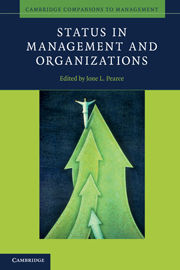Book contents
- Frontmatter
- Contents
- Figures
- Tables
- Contributors
- Foreword
- Preface
- 1 Introduction: The power of status
- Part I How status differences are legitimated
- Part II The influence of status on markets
- 4 The importance of status in markets
- 5 On the need to extend tournament theory through insights from status research
- Part III The role of status in new industries and ventures
- Part IV When ascriptive status trumps achieved status in teams
- Part V Status in the workplace
- Part VI Developing status and management knowledge
- Index
- References
5 - On the need to extend tournament theory through insights from status research
from Part II - The influence of status on markets
Published online by Cambridge University Press: 05 June 2012
- Frontmatter
- Contents
- Figures
- Tables
- Contributors
- Foreword
- Preface
- 1 Introduction: The power of status
- Part I How status differences are legitimated
- Part II The influence of status on markets
- 4 The importance of status in markets
- 5 On the need to extend tournament theory through insights from status research
- Part III The role of status in new industries and ventures
- Part IV When ascriptive status trumps achieved status in teams
- Part V Status in the workplace
- Part VI Developing status and management knowledge
- Index
- References
Summary
Whatever organizational theory one considers, organization and management are viewed as means to motivate and coordinate individuals most efficiently so as to direct all their competences and efforts to the organization’s goals. For instance, early concepts such as Scientific Management proposed selecting the best workers, assigning them to the most appropriate tasks, and using money as a predominant motivator (e.g., Locke, 1982). Despite fierce criticism, especially from advocates of the Human Relations movement, monetary incentives are still considered by scholars and practitioners alike as prime motivators of individual behavior and performance. Studies and publications focusing – on the one hand – on single problems and issues of motivating workers and managers by means of money to work hard, and rewarding them for their productive contribution, or – on the other hand – on developing the optimal compensation schemes are overwhelming.
Explaining existing compensation structures, analyzing normative properties of alternative compensation schemes, and determining efficient executive compensation systems are at the center of personnel and organizational economics (e.g., Lazear, 1999; Encinosa, Gaynorb, and Rebitzer, 2007; Lazear and Shaw, 2007). This literature analyzes the motivational effects of compensation and reward systems at the organizational level, and predominantly emphasizes the need to increase shareholder interests by defining and applying optimal employment contracts and efficient pay structures (e.g., Becker and Huselid, 1992). Of special interest among neoinstitutional economists and organizational theorists is the theory of tournaments, as it provides a rigorous formal model to explain the phenomenon of disproportionate executive compensation, for instance.
Information
- Type
- Chapter
- Information
- Status in Management and Organizations , pp. 118 - 152Publisher: Cambridge University PressPrint publication year: 2010
References
Accessibility standard: Unknown
Why this information is here
This section outlines the accessibility features of this content - including support for screen readers, full keyboard navigation and high-contrast display options. This may not be relevant for you.Accessibility Information
- 5
- Cited by
